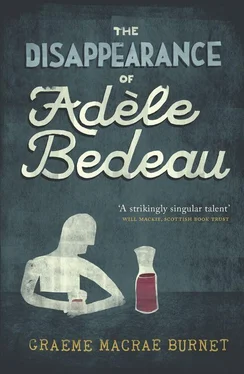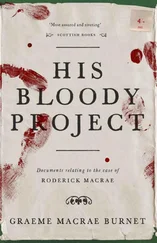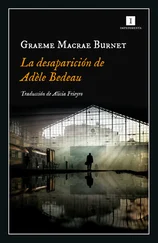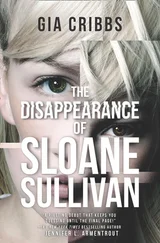The clearing had changed little since Gorski’s last visit. A few years before, storms had brought down a few trees, which were already blanketed in moss. They resembled peacefully sleeping bodies. Gorski sat on one of these fallen trunks and took his cigarettes from the pocket of his jacket. It was chilly beneath the foliage. There was no sign of what had occurred twenty years before. Gorski sat smoking in the clearing. He had no real idea why he had returned, although naturally the disappearance of the waitress had revived his memories of the murder of Juliette Hurel. Was it possible that the two events were connected? Both involved teenage girls and had occurred in the same locale, albeit twenty years apart. It was not unheard of for killers to lie dormant for years, however; nor was it out of the question that there were unsolved murders elsewhere that were the work of the same man. But, in all likelihood, the only connection between to two crimes was Gorski himself. In any case, until Adèle Bedeau’s body turned up, Gorski could not even be sure that he was dealing with a homicide. Murder was, at this point, merely the most likely of the scenarios he had turned over and over in his head. Without a body, he had nothing to go on, no time or cause of death, no forensic evidence, no motive. So, in lieu of any tangible leads, he had wandered into these woods in the vague hope of a moment of insight. Gorski shook his head and gave a little laugh through his nose. There was nothing to do but wait. He was no more in control of the destiny of this case than he had been all these years before.
He finished his cigarette and got up. He felt weary and the seat of his trousers was damp from the moss. He trudged back along the path to the side road where he had left his car. As he drove back towards the town he passed the cottage the Hurels had rented. He drove back into Saint-Louis and pulled up outside a grocer’s. He went inside and bought some fruit and other items. The woman at the till asked him if he had found the waitress yet.
Gorski shook his head. ‘I can’t say too much about it,’ he said.
The woman gave him a look as if to suggest that Gorski had just taken her into his confidence.
‘Mum’s the word,’ she said with a meaningful nod.
‘I appreciate your discretion,’ said Gorski.
He asked for two packets of Gitanes and stuffed them into the pocket of his jacket. He decided to walk the ten minutes to Rue des Trois Rois. His father’s pawnshop was now a florist’s. After his father’s death, Gorski had not had the will to have it cleared out and it had lain empty for years.. For some reason he was glad it had become a flower shop. The owner, Mme Beck, was a cheerful sort who made a habit of looking in on his mother, who still lived in the maisonette above the premises. The florist often brought Mme Gorski off-cuts from bouquets to spruce up her living room. The apartment was still accessed through the back of the shop and the brass bell which rang when Gorski pushed open the door was one of the few remnants of his father’s shop. Mme Beck was busy with a customer when he entered. Gorski gestured towards the stairs behind the counter and made his way up to the apartment. The florist mouthed a greeting and waved him through.
In his childhood, the shop stayed open until seven in the evening and after school Gorski would sit on a stool doing his homework on his lap, while his father, in his brown store-coat, a pencil behind his ear, leaned on the counter. In the backroom, Gorski’s mother sat at a rickety desk, updating the huge leather-bound ledger in which the transactions were recorded. Her handwriting was an elegant copperplate. At six o’clock Madame Gorski went upstairs to prepare the evening meal. At this point it fell to the young Gorski to record any further business in the ledger. He treated this task with great solemnity and would hunch over the great book, tongue peeping from the corner of his mouth, aware that his parents’ livelihood depended upon the accuracy of his entries.
The shop was a trove of jewellery, string-less musical instruments, bric-a-brac, furniture, military paraphernalia, silverware, books and taxidermy. It was Monsieur Gorski’s policy to offer a price on every item brought into the shop, no matter how worthless. ‘You never know,’ he liked to say, ‘what a customer may bring in next time.’ The shop smelt fusty. The windows were piled so high with goods that little natural light entered the premises and Monsieur Gorski kept the lighting inside dim. ‘Respectable people are ashamed of entering a pawnbroker’s,’ he would say. ‘They do not wish to be illuminated when they do so.’
At precisely seven o’clock Monsieur Gorski would step out from behind the counter and wordlessly turn round the sign that hung on a string on the door. He would then remove his store-coat, hang it on the hook behind the counter, put on his suit jacket and, carefully adjusting the cuffs of his shirt, ascend the stairs for the evening meal. The Gorskis never took a holiday.
Gorski knocked lightly on the door of the apartment. He visited once or twice a week, but his mother always behaved as if it was a tremendous surprise to see him. Sure enough, she greeted him with a delighted ‘Georges!’ when she opened the door and kissed him warmly both cheeks.
‘I brought you a few things,’ Gorski said, setting the brown paper bag of groceries on the counter in the kitchenette.
‘Georges! I’ve told you, you mustn’t,’ she said.
Mme Gorski was in her eighties, but aside from the arthritis that made it impossible for her to leave the apartment, she was in excellent health. Her mental faculties showed no sign of waning. She refused to countenance any suggestion that she might be happier in a nursing home. Nor would she consider moving in with her son.
‘I don’t want to be a burden,’ she would say. ‘In any case, this is my home.’
Gorski never pressed her. The thought of his mother cooped up in the little apartment saddened him, but the idea of his mother and Céline living under one roof was absurd. He had never even broached the subject with his wife.
Mme Gorski chatted merrily to him as he set about preparing a salad and some tinned sardines he had bought. He laid everything out on the table in the living room and they sat down to eat. He poured each of them a small glass of the sweet white wine his mother liked to drink.
Monsieur and Madame Gorski would speak little during the working day. On the rare occasion that a particularly interesting item was brought into the shop, it was only over the evening meal that it would be discussed. It was not businesslike to show enthusiasm or even interest in the presence of customers. Monsieur Gorski had perfected a tone of complete monotony, which he used whether making an offer on a valuable painting or a worthless piece of costume jewellery. After dinner, he would peruse the day’s newspaper for half an hour, before leaving the house for the Restaurant de la Cloche, where he would drink two or three glasses of red wine and perhaps take part in a game of cards with some of the other local shopkeepers.
Once a month Mme Gorski took herself to Mulhouse for the Saturday market. From the age of twelve, the young Gorski was charged with keeping the ledger. Saturday was an important day for the business. Fewer items were brought in — customers preferring to commit this shameful act when the shop was quiet — but Saturday was Selling Day. From six o’clock in the morning Gorski and his father would sort through the items that had reached their redemption date and display them prominently in the shop. On Saturdays, Monsieur Gorski cast off his tedious tone and spoke lyrically about the craftsmanship, rarity and beauty of the items for sale. He did not press customers to buy, instead, allowing his enthusiasm and expertise to lure them into a purchase. He never explained his strategy, but he knew his son was observing everything. Gorski understood he was being subtly instructed in the running of the business and that in due course he was expected to take over.
Читать дальше












